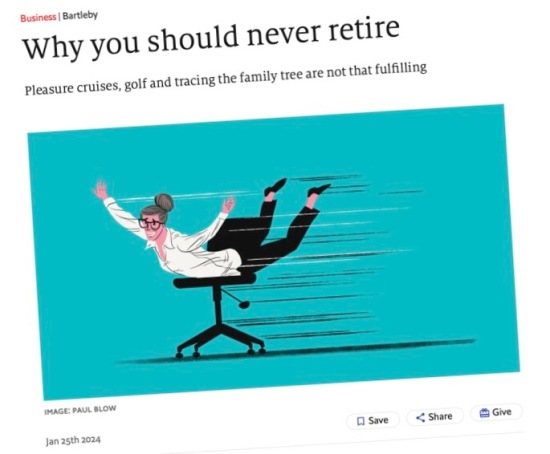The Economist‘s “Bartleby” column typically offers thoughtful contemplations on work and career related matters pertinent to managers, executives, and other professional workers. In the current issue of this venerable British newsmagazine, Bartleby serves up a thought-provoking headline: “Why you should never retire” (link here, but may be paywalled).
Bartley acknowledges two main questions that many professionals face when pondering retirement: Finances (can I afford to retire?) and purpose (what shall I do during retirement that brings meaning?).
Bartleby then adds a third question, one that is related to purpose but more nuanced: If I retire, how will I feel relevant? In other words, “leisure gives you all the time in the world but tends to marginalise you as you are no longer in the game.” The piece adds:
…(C)an anything truly replace the framework and buzz of being part of the action? You can have a packed diary devoid of deadlines, meetings and spreadsheets and flourish as a consumer of theatre matinees, art exhibitions and badminton lessons. Hobbies are all well and good for many. But for the extremely driven, they can feel pointless and even slightly embarrassing.
That is because there is depth in being useful. And excitement, even in significantly lower doses than are typical earlier in a career, can act as an anti-ageing serum.
There may be something of a gendered component to these questions, with men disproportionately linking purpose and relevance to their work. I know that I fall into this category. By contrast, I also know some moms holding very significant jobs whose kids and grandkids would offer all the purpose and relevance they need in retirement. (Of course, no doubt some men fall into this category as well.)
In addition, as the Bartleby piece suggests, abundant options exist for engaging in meaningful, richly rewarding activities with the freedom of time provided by retirement. It could be in the form of volunteer work taking advantage of one’s professional skills, or perhaps picking up new skills that lead to a brand-new form of service. Maybe it involves giving one’s heart to a house full of animals or working at the local rescue shelter.
Speaking personally
During the heart of the pandemic, when my university held classes almost exclusively online (via Zoom), I frequently thought about retirement. In particular, teaching larger classes on Zoom was a draining experience for me. I found myself thinking that if this was my future as a professor, then I’d want to retire as soon as feasibly possible.
Today, I have a new burst of energy for teaching since returning to the in-person classroom. I also have a deepened engagement with my scholarly, public education, advocacy work on topics such as workplace bullying, therapeutic jurisprudence, and advancing human dignity generally. Purpose? Relevance? I feel both in abundance right now, and I’m trying to maximize those experiences and opportunities.
Retirement: The enormous privilege of choice
Of course, all of the above presumes the enormous privilege of choice when it comes to a retirement decision, and that option does not extend to everyone. Here in the U.S., we are in the unfolding stages of a major retirement funding crisis that will stretch over the generations without a big fix, a topic I have written about often on this blog. (For example, here, here, and here.) Millions are working well past traditional retirement ages because they need the money, not because they’re finding any deep intrinsic rewards in the work itself.
The creation of a better retirement system is a big public policy challenge for America. Despite the glaring human needs, however, I don’t sense a lot of political will for enacting much-needed reforms, especially if they must be paid for by the powerful and well-to-do.
Thus, for those who continue to work deep into their later years because they must, I hope we will discover our heart quality sooner than later when it comes to boosting our Social Security program, among other things. And for those who continue to work because of all the rewards it may deliver, I hope it will be with a sense of gratitude and responsibility for the work itself, matched by a spirit of generosity towards helping those in need.

And then there is also burnout, at an epidemic rate of over 50% for physicians, but also problematic for many other jobs. Burnout is mainly caused by system blocking of physicians’ ability to heal for for others to do their jobs as well as they can.